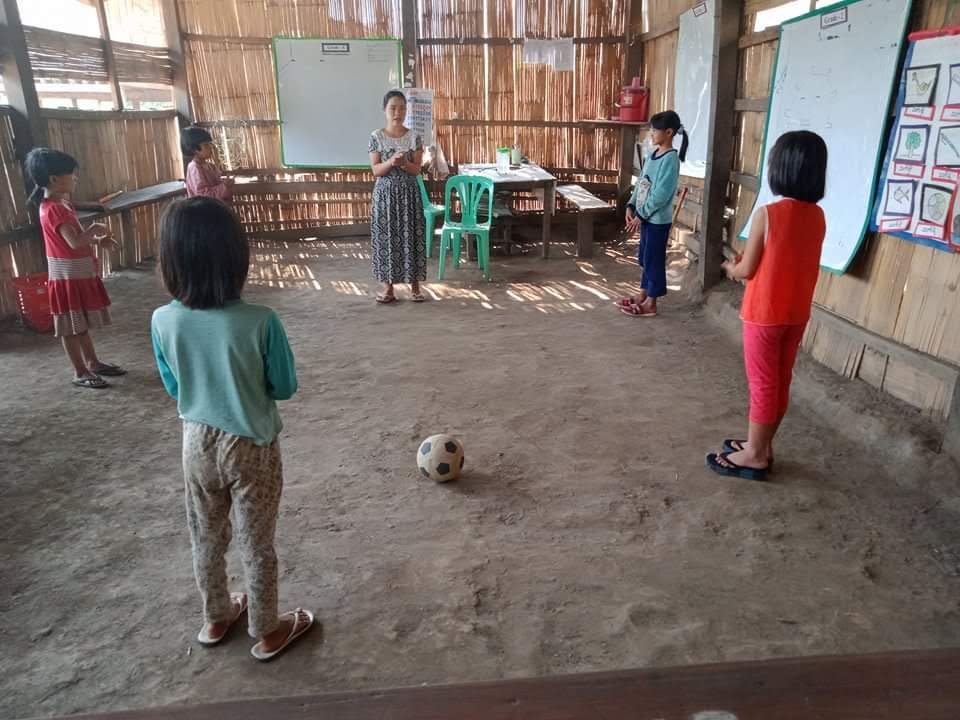In rural communities in Myanmar, a 12 year old girl is considered to be old enough to work or get married to help the family - but before the pandemic, Eee Nwant's parents were proud of her academic progress, and they wanted her to continue her education. Neither of them had ever been to school, and they used to work in Thailand to support their children whilst Eee Nwant stayed with extended family.
But the pandemic changed everything for Eee Nwant. Her school closed, and her parents lost their work opportunities in Thailand. They found a plot of land to grow the rice they needed for the year to come, and they asked Eee Nwant to work assisting them with farming.
She was devastated, but she didn’t want to let her parents down so she said ‘yes’ to working on the family’s land. Sadly, Eee Nwat’s family are not alone. Child labour tends to rise in proportion to poverty; according to a study from The World Bank, a 1 percentage point rise in poverty globally leads to at least a 0.7 percentage point increase in child labour.
At United World Schools, we're working hard to support families and get every child back to school - and back to childhood. To help Eee Nwant continue her education, UWS reached out to her parents to let them know about a new, COVID-safe programme we’re running.
Whilst schools have not yet re-opened in Myanmar, our teachers are facilitating flexible distance education by running smaller school groups once a week. This allows us to teach new skills weekly, and give children educational projects to complete within the week before they return.
Eee Nwant misses going to school every day, but she’s happy to be attending once a week and continuing her education. The UN warns that 24 million children may never go back to school after lockdown ends, and the world's poorest children are most at risk of dropping out of school.
Through interventions like this, we're giving children like Eee Nwant a road back to education, back to childhood and back to a brighter future.
Communities like Abhira’s have been severely affected by the impact of the national lockdown. They survive on a low daily wage so being unable to work means struggling to feed their families. The lockdown has caused severe anxiety in Abhira’s community.
What's more, fewer than half of the communities we support in Nepal have access to the internet, making it impossible for them to access an online education. We turned to a medium many might consider old-fashioned: radio.
Over 85% of households within the communities we work with have a radio. So we began teaching a daily lesson over a handful of local radio stations, with prompts for further homework. Within weeks, 10,000 children were listening each day and more radio stations wanted to broadcast our work - we now work in collaboration with 10 local FM stations.
Every day, Abhira is one of the 10,000 children who tunes into our daily radio programme, through which we are delivering lessons remotely and sharing vital public health information about preventing the spread of coronavirus.
“I tune into the radio everyday and enjoy listening to stories and fun facts. Due to the radio programme and support from my teacher, I feel more relaxed now. Me, my family and community are aware about coronavirus and how to stay safe.”
- Abhira
The longer vulnerable children are out of school, the less likely they are to return. By supporting children in innovative and accessible ways during the crisis, we’re making sure they don’t miss out on education now and in the long-term.
Name has been changed to protect identity.
Nabina became a UWS Fellow in April 2019 and has been living and working in the Khamare community in Eastern Nepal. Nabina told us about her daily life and the reality of teaching the unreached.
I have never experienced this extreme heat on a daily basis. “Khamare has never been hot like this,” say the locals. But now winter is arriving and the days are changing. It is more chilled now and I can feel the cold is only going to get stronger.
Mornings here usually consist of tea and lots of free time. I normally support my host family with household chores, but in recent days my mornings are quite unusual. I have started extra morning classes for the students of Grade 5. Therefore, I get up early, drink a hot cup of delicious milk, check my lesson plan and head straight to the school. I teach the students of Grade 5 from 7:30 to 8:30am. After finishing the extra class, I return home to have a meal. The walking distance from my host house to my school is about 10 minutes. I usually return to the school at 9:30am.
Most of the time, I am the first teacher to reach the school. Some students come early to school to play with their friends. As soon as I see my students, I greet them with a warm smile. When I first started working here, they seemed hesitant and shy to greet me back but now they seem more relaxed, comfortable and happy while greeting me. Then, I open the classroom doors and have a little chitchat with the students, sometimes about their studies but generally about other parts of their lives. I have come to know about lots of plants, local games, local food, people’s lifestyle and their way of communication from these small talks. Sometimes when the school surrounding seems a little unclean, I ask the students to help me clean. This small step has not only helped in keeping the environment clean but has also made the students accountable for their actions. It has helped the students become mindful of throwing their waste anywhere and everywhere.
I greet all the other teachers as they arrive and we usually have a conversation before assembly. The content of the conversation varies according to the situation. Recently, the topic has been ongoing examinations. At 10:00am, morning assembly starts. I have been trying to make the morning assembly more productive by providing an opportunity for the students to build their confidence and showcase their talent. The initiative has been supported by the whole school and it is so overwhelming to see different students prepare and come up with quiz questions, poems, drawings, and songs every day to present in the assembly.
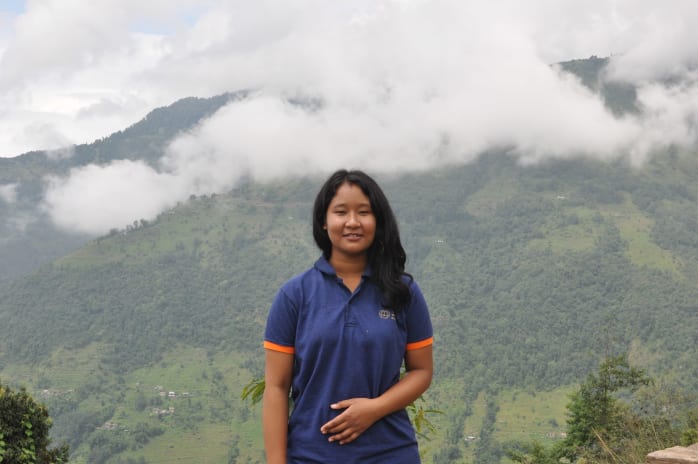
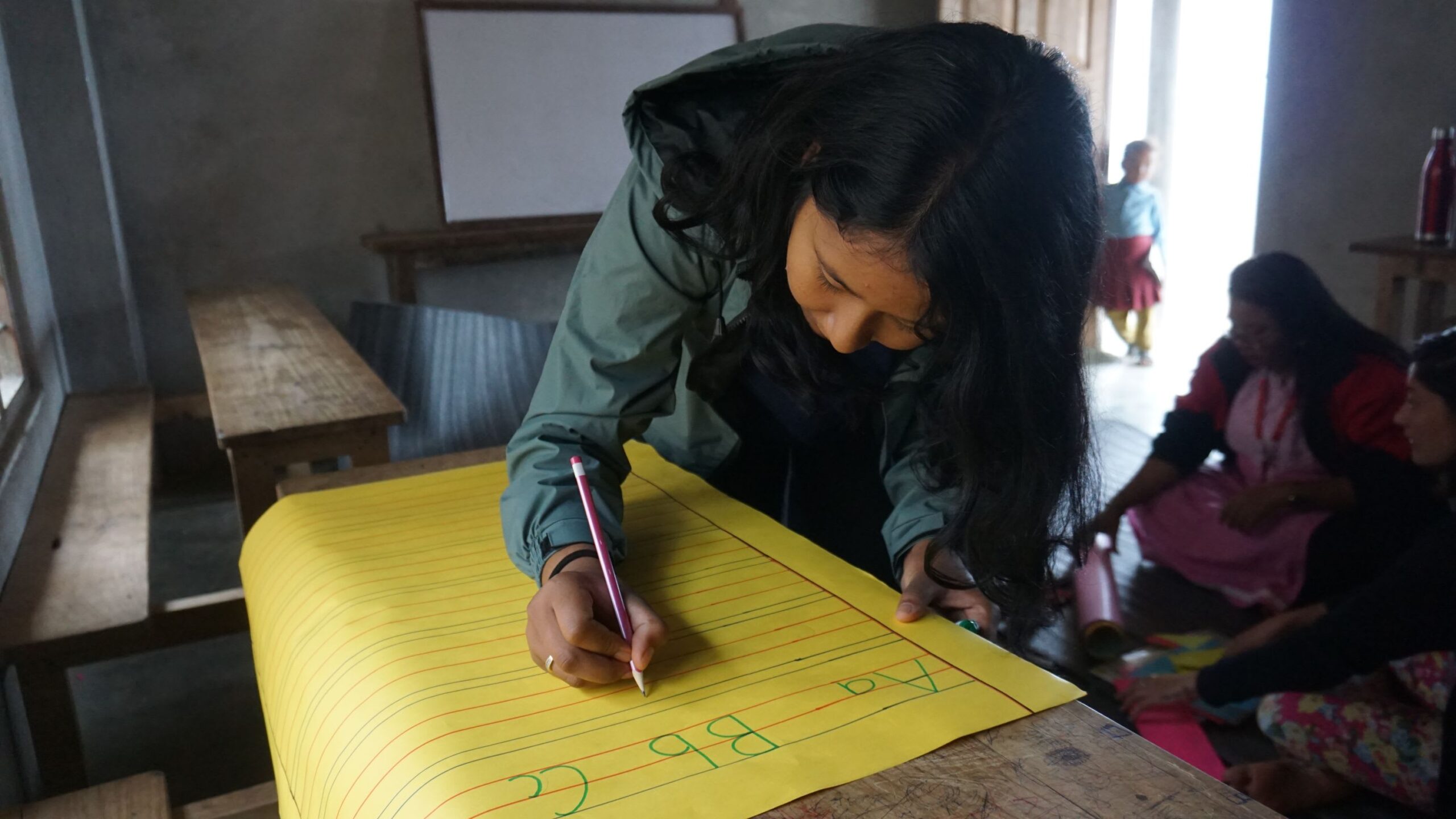
I take classes from the 1st to 5th period continuously. So, I am rarely in the teacher's office during these hours unless there is a meeting. The 6th and 7th period is my free time. I normally spend this in the Kindergarten class crafting or making informative materials for the classrooms. The school hours for students end at 4:00pm with evening assembly where I summarise the important events of the day and give out notices if there are any. After the assembly, I along with other teachers check the windows and doors of classrooms and staff rooms to make sure that they are properly locked. It is usually just me and the Grade 4 students who are left in the school after 4:00pm as I take their extra evening classes. The class is about 45 minutes to an hour long.
After finishing the class, I return home. I freshen up, eat some snacks while having a conversation about the day with my host family. Despite my busy schedule and hectic work, I always try to have some 'me time' for some hours before dinner. I listen to some good music, go through social media, reflect upon the day and sometimes watch television or take an evening walk. After dinner, I plan lessons for the next day and go to sleep.
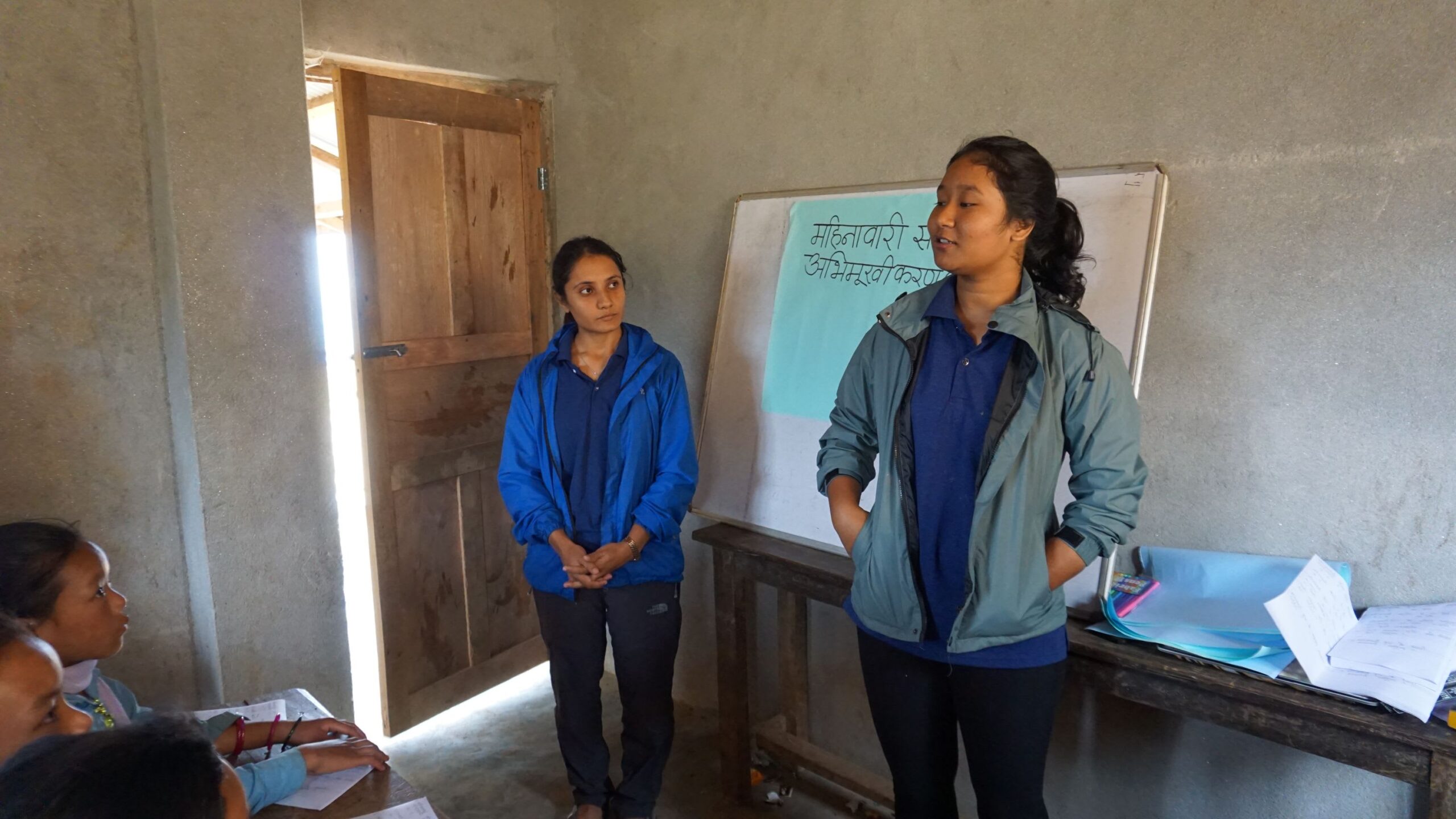
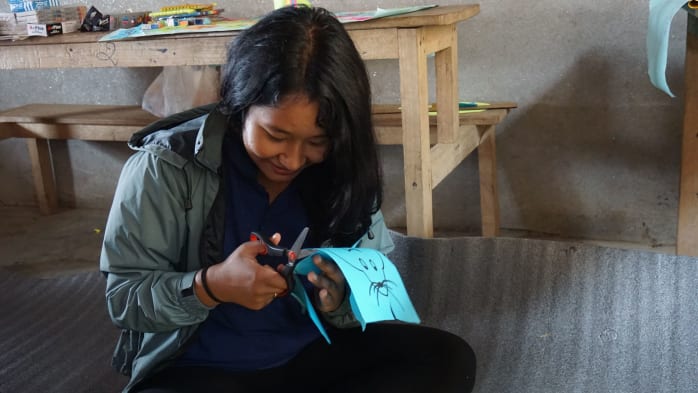
MEET JUNA*
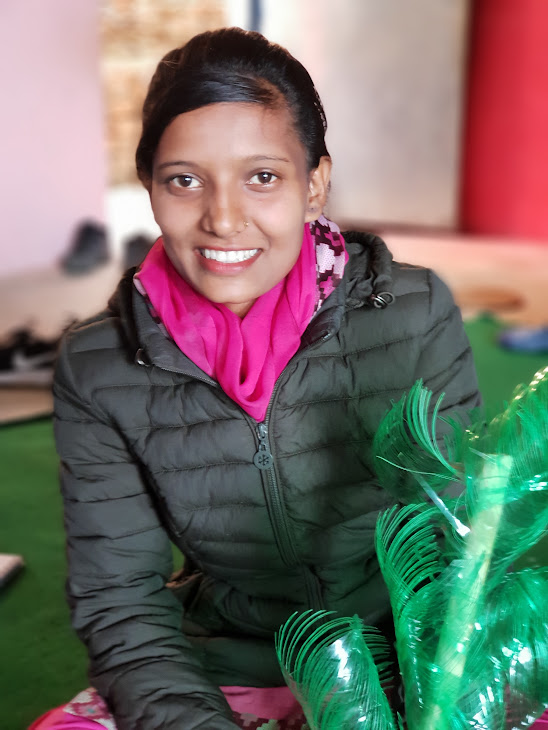
Now she teaches the kindergarten class at the school, having received early years training from education specialists.
Despite being the youngest teacher at the school, Juna is determined to have a positive impact. She has been working alongside the Fellow at the school to create a plastic-free environment. Plastic is a huge environmental issue for many rural communities in Nepal, as they often do not have access to the infrastructure to dispose of the growing amount of plastic packaging.
Juna has been teaching her students how to re-use plastic, creating hanging baskets made out of bottles to decorate the school. She has also made a tree out of plastic for her classroom. Juna’s innovation and determination for change is a real inspiration to her students, her community and the UWS team.
*Names have been changed to protect identities
"I have always felt like I would not have enough to provide education for my children. But now that there is a functioning school built and run by UWS Nepal, I am ever confident that our lives will be changed for the better.“
– Mother of child at UWS Kalleri School
About Kalleri village
The village of Kalleri is situated in Eastern Nepal, and is home to approximately 900 people. With the nearest government school a three-and-a-half hour walk away, education was always a distant dream for this community. Without the ability to read, write or count, job opportunities are limited for the families in Kalleri village, with most surviving as subsistence farmers. With little money, they had no hope of building a better life for their children and were trapped in a cycle of illiteracy and poverty.
In 2017, UWS started working with this community to change this. We developed a school a short walk away from children’s homes. We trained teachers from the village, providing local job opportunities. Now, over 200 children attend UWS Kalleri School everyday. They are learning the skills they need to open pathways to secondary school and to access opportunities other than farming. Education is empowering the children of Kalleri village to lift their community out of poverty.

The beginning of Bopha’s journey
In 2010, UWS learnt about the need for a school in Bopha’s village. UWS Tien School opened that same year, our fifth ever school. This meant that over 200 students from the village and nearby areas could start attending school and learn to read and write in the national language. Bopha loved learning and always dreamt of one day becoming a teacher.
Determined to teach
After passing all of her exams, Bopha spent three years studying at secondary school, staying in one of our UWS dormitories. She then went on to complete her teacher training for three months. Bopha recently returned to UWS Tien School as a teaching assistant. Attending a UWS school has meant that Bopha’s dreams have now become a reality. Not only is she teaching the next generation of children from her village to read, write and count, she is also inspiring them to pursue their dreams.
Most of the adults in his village are illiterate. They also don't speak Khmer, so even if the government built a school nearby, the children would not be able to understand their teachers. For a long time, education did not seem possible for this rural village.
DETERMINED TO TEACH
Rochom was adamant that the children in his community should have an education. In 2005, he started teaching the local children, holding lessons underneath his own house. As word of Rochom's classes spread, more and more children attended his makeshift school. Rochom had no learning resources or electricity to help him, but he was determined to teach.
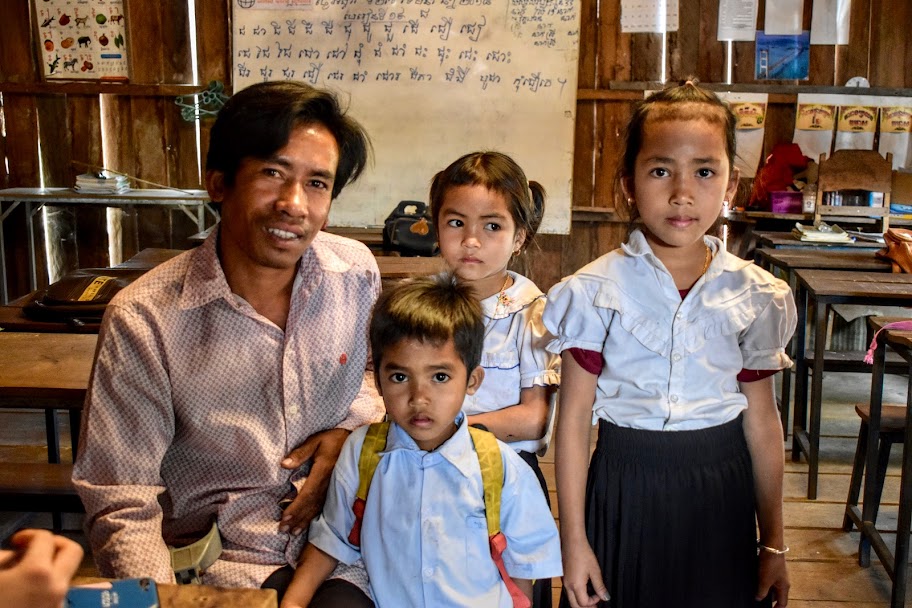
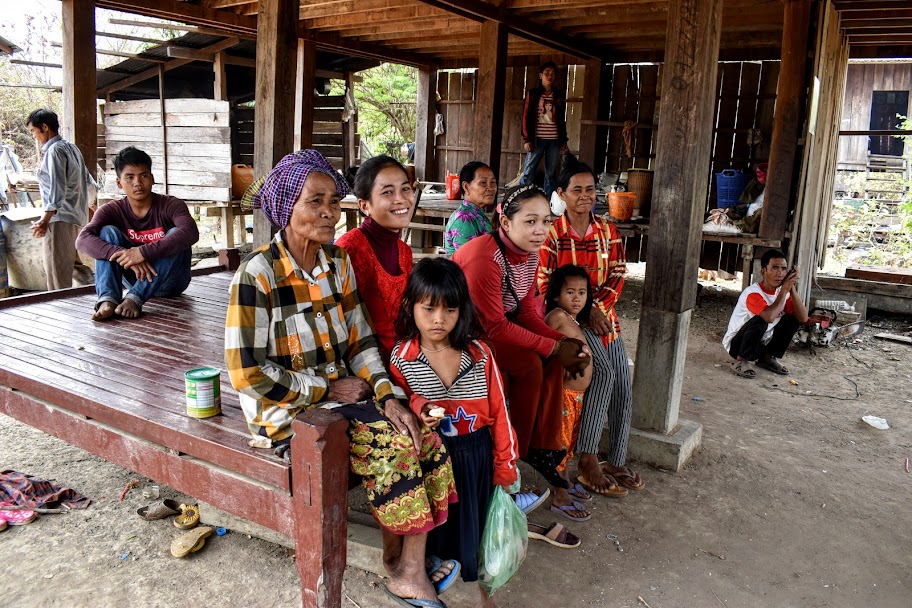
BUILDING A SCHOOL
In 2010, UWS heard about Rochom's efforts and about the wish of the local people for their children to have an education. Our team witnessed the children who were determined to go to school, even if they had no books or pencils. We decided to build a place to learn and train more teachers to help Rochom.
When the school was ready to open, Rochom was asked to be a teacher there. He underwent formal teacher training and was given a classroom equipped with whiteboards, stationery, and a library full of books.
THE SCHOOL TODAY
Today, Rochom has been teaching at the school for 8 years and over 100 students attend his classes. Rochom enjoys teaching maths and Khmer most. Once students have a basic knowledge of these subjects, he says, they can go on to do anything.
Rochom has seen this change firsthand. Over the past two years, 13 of his students have gone on to secondary school. To help them, UWS built a dormitory next to the nearest government secondary school. This school is too far for the children to walk to everyday, so the dormitory provides somewhere safe for students to stay during the week. Rochom hopes that more children will attend secondary school in the future, and maybe even university. Plus, girls in the village no longer have to stay at home and marry young. Their education has given them more choices.
Education hasn't just affected Rochom's life, but those of his five children. His youngest son and three daughters all study at the UWS school in their village. His oldest son is 18 years old and spends the weekdays at the dormitory block, so he can attend secondary school. Rochom is so proud of his son and is excited for his future. Education has transformed their lives.
MEET BOULIN:
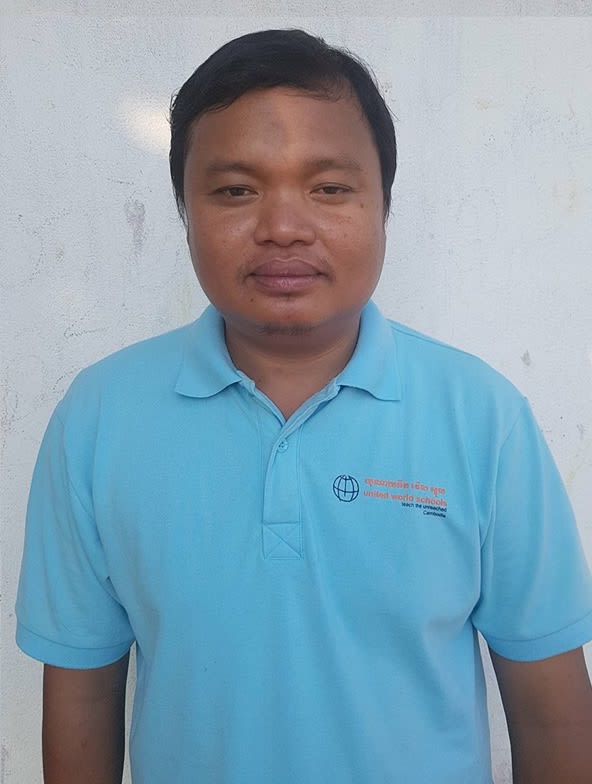
Keo Boulin is the Education Officer for five primary schools in Siem Pang Disctrict, Northeast Cambodia. He joined the UWS Team in 2017, and has been working hard to support remote communities ever since. Keo Boulin is also part of our Education Team for Stung Treng Province.
We sat down with him to find out more about his work with UWS.
Thanks so much taking the time to be interviewed! Can you describe a memorable moment that has happened in your job recently?
When I teach our teachers to use materials and maths, and they understand, I am very happy. I am also happy when I go to schools and see the students studying and smiling, and when I see how the team is working well and helping each other.
What does your typical day look like in brief (how do you get to school, when do lessons start, what time is lunch, when do you finish teaching, what do you do after lessons)?
I always ride my motorbike to the school and leave the office at 5am. I arrive at school at 7am for monitoring and teaching. I have lunch at the school at 11:30am. During the school's free play I sit with the students to read books in the library and play with the LEGO.
What is your favourite thing about your job?
My favourite thing is to share my knowledge with the students and teachers at the schools.
What is the hardest part of your job?
The hardest part of my job is encouraging older children to go to school because their families don’t always understand the importance of education. Often they will take their children to do the work at home or to go to the farm. The children want to go to school but it is hard if parents say come to work.
Do your government and community teacher face any challenges?
Sometimes the knowledge of the community teachers is low. Some of them only studied until Grade 4 or not at all. This can prove challenging. The main challenge that government teachers face is that in some communities the children cannot speak the national language, and they speak in their tribal language which the teacher doesn’t always understand.
How does education policy in your country have an impact on teaching of your teachers?
We don’t train the school's Principal but their role is very important. They must be effective and responsible and have trust from all the community.
What would you like people in other countries to understand about education in your country?
I want to tell people that in Cambodia there are not enough teachers, classes and materials for children in the unreachable areas. In some villages the only schools they have are just underneath the houses of the people who live there.
If you could change one thing about your job, what would it be?
I want to change the communities ideas about the education. For example, they need to push their children to go to school everyday, and they must support the school's development in their village.
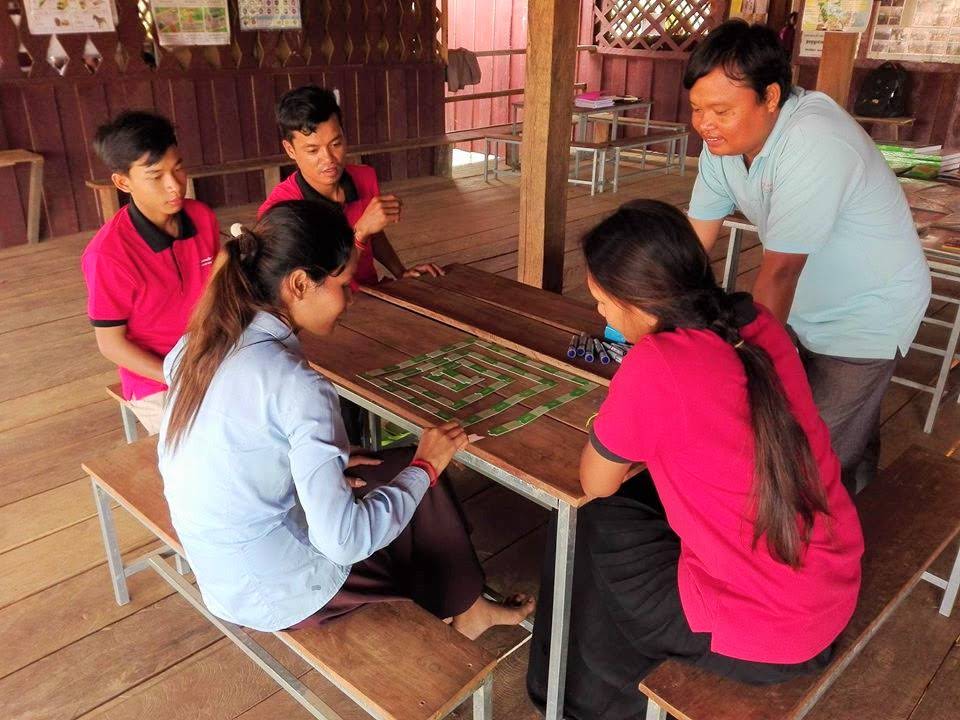

How long have you been working for UWS?
I have been working for UWS for four years now. Before I was working here, I was actually a teacher in a school and I also worked for a company.
Why do you think education is important?
I think education is very important, especially for the children in the really remote villages where we work. They can improve their knowledge and they can learn more about the society they live in.
And, can you tell us a bit about the work that you do day to day?
Most days, I travel to the villages and go into schools to prepare the library so it is interesting and interactive, so the children want to go to read books and stories during break times. It is a space that they can really learn in, even outside of lessons.
Why is being able to read important?
When children can read and write they can learn from the stories. Reading is a skill which opens so many doors. When children can read they can use electronic tools such as computers too.
How do you think this will help to change communities?
When children can read and write it can change their social standing. If they are able to read they can engage in the community and they can help to develop where they live. Take agriculture. When students learn about this from books and from the internet, they can take this knowledge back to their communities and teach their families how to plant and grow different things. A lot of the older generation in communities cannot read, and a lot of them cannot even speak the national language so it is important to give the younger generation these skills.
Finally, do you enjoy working for UWS and why?
I love UWS with my whole heart and I am so happy to work here and with the children in the communities. I really really love it so much. My favourite part of the job is decorating and preparing the libraries to help to actively engage the students.
We can only work with talented staff like Nakcy thanks to your support. Donate today and help us give more students the gift of reading.

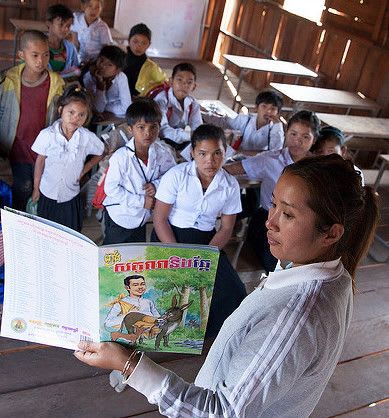
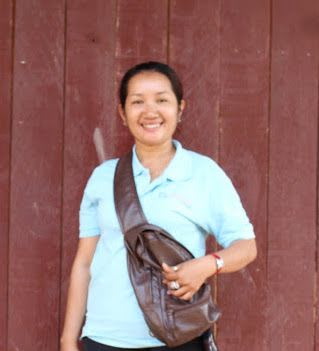
Can you tell us a little bit about the UWS dormitories? Why do we build them?
The reason we build dormitories is that when students live so far away from towns they don’t have easy access to higher education. When we build dorms these students can change their living conditions and continue their studies. The second reason is for the girls.
Because fewer girls are able to attend secondary school?
Yes, due to concerns from parents about their safety travelling to and from school. When our dormitories are built this provides a safe space for the girls to live during the week so they can continue to study.
Do you know how many students UWS supports through the dormitories?
In Ratanakiri Province there are 3 dormitories, and overall we support 125 female students and 150 male students. We are currently building one more dormitory in a neighbouring Province.
What challenges do girls face in education and how do our dorms provide opportunities for girls?
When I go to the dormitories I always ask all the female students what challenges they face and they always reply with “none!”. This is because living in the dormitories is easy and safe for them. Also, UWS provides them with anything that they need, including sanitary towels so they can continue going to school on their periods. This programme really makes such a difference to girls’ education.
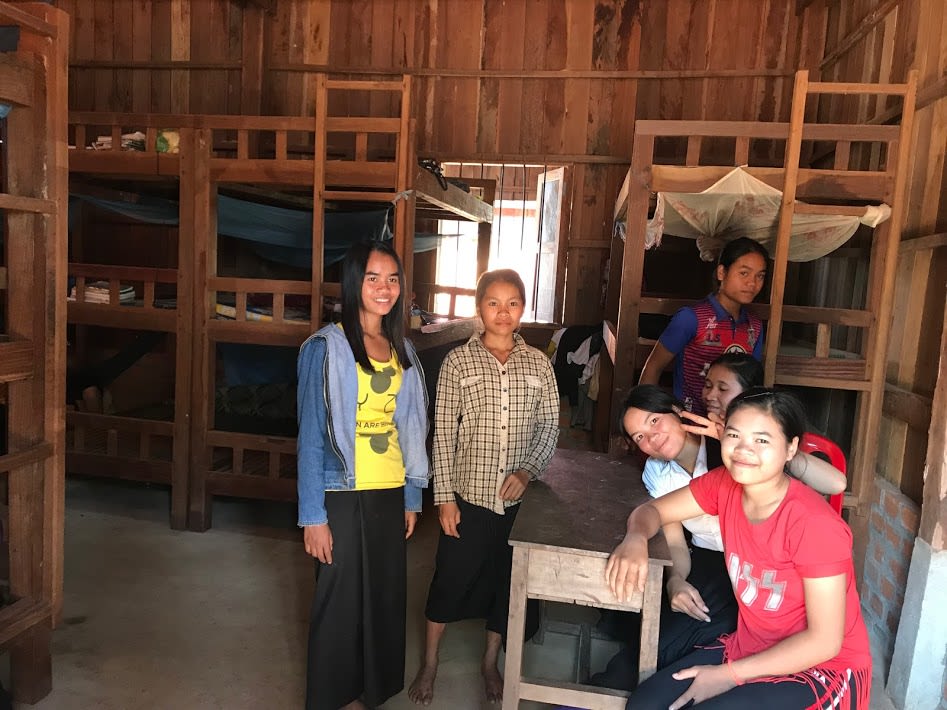
Can you tell us a bit about the hygiene education that you give to the girls in the UWS dormitories?
I take them sanitary towels once a month. After I have made sure that every student has a packet I teach them how to use the sanitary towels, how to keep them and also how to dispose of them. I explain to them the best way to use the products and not affect their health for example changing the pad often, every couple of hours. Most female students have encountered sanitary towels before, but some families just can’t afford to buy them every month and so the girls need this education.
What impact do you think these dorms have on the students, their parents and the communities?
The people living in the communities are very happy that there are dormitories being built so they can send their children to secondary.
There are lots of stories about students in rural communities leaving primary education to get married. Do you think that having access to dormitories will change this at all?
Unfortunately young marriages are still happening in the rural communities with children dropping out in grades 5 or 6, although the number is lower than it used to be. Dormitories can make a difference, if children stop studying altogether they are more likely to get married. It really depends on the students. If they fall in love and want to get married they stop studying, but dormitories seem to help girls focus their education.
MEET SREYMOM:
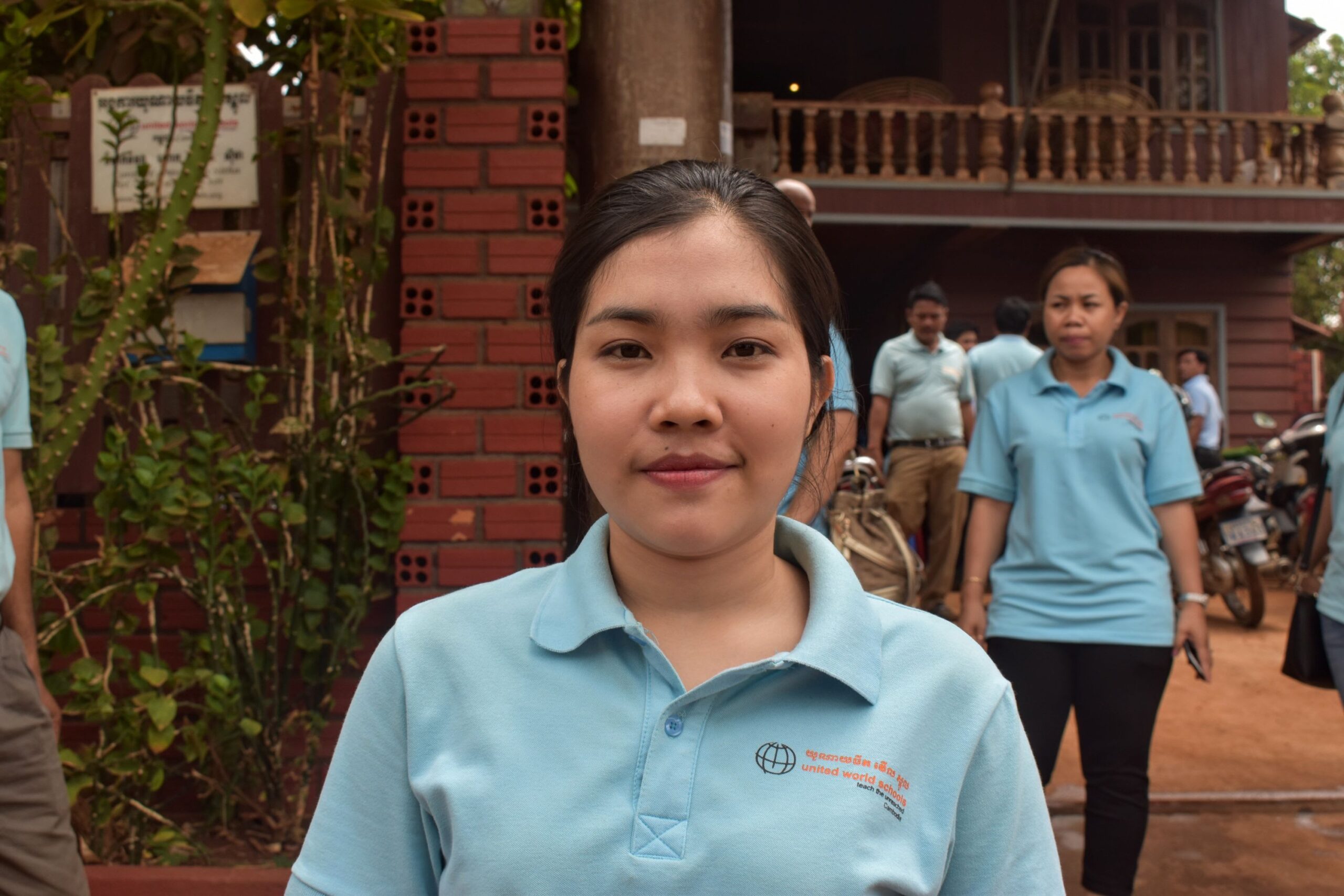
Born and raised In Banlung Town, Ratanakiri, Sreymom originally worked in the field of education as a teacher in Heng Leang school, joining UWS Cambodia in February 2017 as an Education Officer for our primary schools. She also used to work with the international NGO UNICEF and ran healthcare projects in Borkeo district.
We sat down with her to find out how she was getting on with her new position at United World Kindergartens.
Great to have you part of the UWK family! How are you settling in?
I like it klang na! (so much!) My favourite part is working with the children and the villagers and seeing the smile the children have when they are singing songs and playing.
Why did you want to make the switch from primary to early years education?
Because I want to gain new experiences. I love working with children as well.
I was so happy to start working here, I am excited to learn and to share everything that I know with the kindergarten team.
And what does your new job involve?
Most days I am working out in the villages, supporting the teachers, providing training. I teach them how to use the materials and demonstrate good teaching practises, singing songs and reading stories, as well as conducting hygiene workshops and helping to cook and feed the children. Every day is different.
What do you hope for the future?
I really care about the students and how they are doing. I would love for everybody in the villages to be inspired to learn, and in 10 or 20 years I hope our own students would be able to become teachers.


